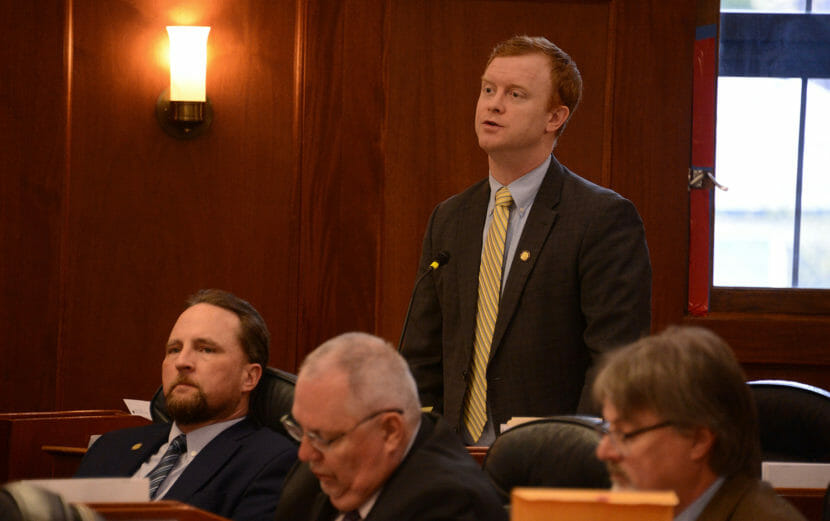
The Alaska Supreme Court will not have a chance to rule on the case of a legislator accused of violating the state constitution’s disloyalty clause, clearing the way for him to take office.
On Tuesday, Matanuska-Susitna Borough resident Randall Kowalke said he will not appeal a lower-court defeat to the state’s high court, citing the risks of a failed argument.
The decision means Rep. David Eastman, R-Wasilla, is set to be sworn in for a new term Jan. 17, but it leaves legal ambiguity around how the disloyalty clause should be enforced in the future.
Kowalke said he is “absolutely” disappointed by the outcome after he sued Eastman and the Alaska Division of Elections in July, challenging the division’s decision to certify Eastman as a candidate despite more than a dozen objections.
Kowalke alleged that Eastman’s membership in the Oath Keepers, a group linked to the Jan. 6, 2021, insurrection at the U.S. Capitol and labeled an antigovernment militia by the federal government, violates a clause of the Alaska Constitution.
That clause, written during the 1950s Red Scare, states that anyone who “advocates, aids or belongs to” a group that advocates the forcible overthrow of the U.S. government cannot hold public office in Alaska.
After a weeklong trial, Superior Court Judge Jack McKenna concluded that Eastman is a member of the Oath Keepers and the group does advocate the overthrow of the U.S. government, but that the First Amendment of the U.S. Constitution protects Eastman unless he had “a specific intent to further the Oath Keepers’ words or actions aimed at overthrowing the United States government.”
Though Eastman was present at protests outside the Capitol’s restricted zone during the Jan. 6 insurrection, McKenna concluded that his presence was unrelated to any calls to action by the Oath Keepers and did not violate the First Amendment.
Kowalke said he was dissatisfied with that ruling.
“I was attempting to determine tolerance in Alaska for this kind of stuff,” he said, “and it sort of seems like you could join Hezbollah, but if you made an announcement the day you joined that you had no intention of furthering their goals, you’re good.”
Earlier in the case, an appeal had seemed likely, but Kowalke and attorney Goriune Dudukgian said on Tuesday that the interpretation used by McKenna added a third hurdle for them to surpass.
“We didn’t want to proceed with an appeal where we would create bad law that would be binding precedent and would make it more difficult in the future in Alaska — or even in other states — to bring similar eligibility challenges,” Dudukgian said.
Because the case was not decided by the Alaska Supreme Court, a future judge considering a similar disloyalty clause case isn’t required to follow McKenna’s thinking. He or she could come up with a different interpretation of the First Amendment.
Asked about Tuesday’s decision by Kowalke, Eastman said by text message, “The right of voters in Wasilla to elect their own representatives has been preserved, but the price they were asked to pay to defend that right demonstrates the extent to which Alaska courts have been weaponized against conservative candidates and voters. It is unconscionable that the Constitution was retooled to allow this type of lawfare to take place in Alaska.”
Eastman has repeatedly asked for donations to pay for the cost of his legal defense, and a website created to collect those donations states, “The expense of this trial is expected to cost $300,000.”
Kowalke was represented in his lawsuit by a civil rights firm, the Northern Justice Project, which represented him pro bono. He said the potential cost of an appeal was not a factor.
An official with the Alaska Department of Law said that agency and the Division of Elections are still evaluating McKenna’s decision and what the agency’s next steps will be.
In a pretrial order, McKenna determined that the Division of Elections is responsible for enforcing the disloyalty clause, but his final order on Eastman’s eligibility had little to say about future actions by the division.
The Division of Elections has been without an executive director since the retirement of Gail Fenumiai in December.
The first day of the Alaska Legislature’s 2023 session is Jan. 17 in Juneau.